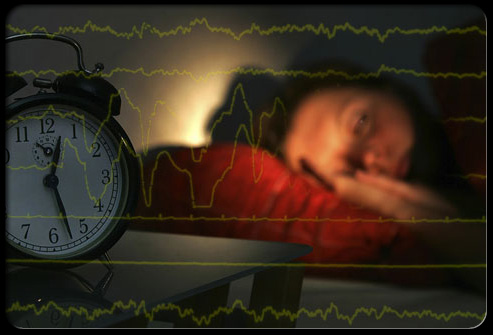Sleeping Disorders.........
Sleeping disorders are conditions that affect how much and how well you sleep. The causes range from poor habits that keep you awake to medical cycles that disrupt your sleep cycle. Insufficient sleep is a serious problem that poses a threat to your health and safety.
Lack of sleep can take a toll on nearly every aspect of your daily life. Sleep deprivation has been linked with poor performance at work, car accidents, relationship troubles, job related injuries, memory problems and mood disorders. Recent studies also suggest that sleep disorders may contribute to heart diseases, obesity and diabetes.
What are the symptoms?
These vary depending on the type of sleep disorder but may include:
- Excessive sleepiness during the day.
- Trouble falling asleep or staying asleep.
- Snoring or brief pauses in breathing during sleep.
- Urge to move your legs at rest or an uncomfortable feeling in the legs at night.
The sleep cycle......
There are 2 forms of sleep.. REM Sleep and non-REM Sleep. REM stands for rapid eye movement and is associated with dreaming. It accounts for 25% of normal sleep, coming in longer periods towards morning. The rest of our sleep time is spent in NREM which consists of four stages from light sleep(stage 1) to deep sleep(stage 4). Sleep disorders interferes with normal sleep cycles, preventing a good night sleep.
How much sleep is enough.....
Sleep needs vary widely from person to person, but general guidelines are:
- 16 hours for infants
- 9 hours for teenagers
- 7-8 hours for adult
Keep in mind that some adults do fine with 5 hours of sleep and others need as much as 10 hours of sleep per night...
Insomia.....
Many people have trouble sleeping once in a while, but when the problem lingers night after night ,you may have an insomnia. People with insomnia may lie awake for hours without falling asleep. They may wake up too early and be unable to drift off again. In many cases, insomia relates with bad habits that interfere with sleep such as drinking coffee, eating heavy foods before bed, smoking, going to bed at a different time each time or falling asleep with the television/lights on.
Insomia is often related to medical problems including arthritis, heartburn etc. It may also occur during the first trimester of pregnancy. Shift workers and regular fliers can develop a circadian rhythm disorder, in this case a sort of ''internal body clock'' that controls sleep, hormone productions and other body functions is disturbed.
Narcolepsy....
This condition causes extreme sleepiness during the day.. People may find it hard to function without naps despite spending enough time in bed at night. Other warning signs include:
- Being unable to move when you first wake up
- Losing muscle control with strong emotions
- Dreaming during naps
- Dream-like hallucinations as you fall asleep or wake up
People with narcolepsy enter REM almost immediately, without the NREM sleep stages that normally lead up to dream sleep...
Sleepwalking.....
People with this sleep problem can literally get up and walk while they are sleeping. The episode occurs during the deeper stages of NREM sleep and the person may do a variety of activities without waking up. Sleepwalkers typically do not respond to questions and won't remember what they did when they wake up.....
Sleep Diary.....
Charting your habits from 1 or 2 weeks can provide valuable information. Include:
- When you go to bed, fall asleep and wake.
- How long and well you slept.
- Time awake during the night.
- Caffeine or alcohol consumed and when.
- What/when you ate and drank.
- Emotion or stress.
- Drugs or medications.
Sleep Hygiene.......
Adopting habits that promote sleep is known as good sleep hygiene.
Exercise..
Regular exercise should be part of the plan, but the timing is important. Exercise in the late afternoon can make it easier to fall and stay asleep - just don't let it get too late. Exercise within a couple of hours of bedtime could make it harder to fall asleep.
Problem foods....
Certain foods and drink should be avoided in the 4 - 6 hours before bed:
- Caffeine including coffee, tea and soda.
- Heavy or spicy foods.
- Alcohol (While alcohol helps some people fall asleep, it leads to night time awakenings)
Helpful foods.....
A light evening snack of complex carbs and proteins can lead to better sleep. Cereal with milk or crackers and cheese fill the bit but they should be eaten an hour before bed. Warm milk and chamomile tea raise body temperature and make many people feel sleepy.
Late night television....
Late night television may be part of your routine but chances are that its not helping you. Television engages the mind and can increase alertness, keeping you awake. Playing video games before bed or surfing the internet may have the same effect. The National Sleep Foundation recommends removing Televisions and computers from the bedroom altogether.
According to Kimball Johnson, MD ...you can signal your body that it is time for sleep by creating a bed time ritual. This may include a warm bath, reading a chapter of a book, or practicing relaxation techniques such as deep breathing.
Stick to a firm bedtime and wake-up time, even on weekends and if need be ,see a doctor!
Living Healthy!!!!!...........
culled from MedicineNet.com
Lack of sleep can take a toll on nearly every aspect of your daily life. Sleep deprivation has been linked with poor performance at work, car accidents, relationship troubles, job related injuries, memory problems and mood disorders. Recent studies also suggest that sleep disorders may contribute to heart diseases, obesity and diabetes.
What are the symptoms?
These vary depending on the type of sleep disorder but may include:
- Excessive sleepiness during the day.
- Trouble falling asleep or staying asleep.
- Snoring or brief pauses in breathing during sleep.
- Urge to move your legs at rest or an uncomfortable feeling in the legs at night.
The sleep cycle......
There are 2 forms of sleep.. REM Sleep and non-REM Sleep. REM stands for rapid eye movement and is associated with dreaming. It accounts for 25% of normal sleep, coming in longer periods towards morning. The rest of our sleep time is spent in NREM which consists of four stages from light sleep(stage 1) to deep sleep(stage 4). Sleep disorders interferes with normal sleep cycles, preventing a good night sleep.
How much sleep is enough.....
Sleep needs vary widely from person to person, but general guidelines are:
- 16 hours for infants
- 9 hours for teenagers
- 7-8 hours for adult
Keep in mind that some adults do fine with 5 hours of sleep and others need as much as 10 hours of sleep per night...
Insomia.....
Many people have trouble sleeping once in a while, but when the problem lingers night after night ,you may have an insomnia. People with insomnia may lie awake for hours without falling asleep. They may wake up too early and be unable to drift off again. In many cases, insomia relates with bad habits that interfere with sleep such as drinking coffee, eating heavy foods before bed, smoking, going to bed at a different time each time or falling asleep with the television/lights on.
Insomia is often related to medical problems including arthritis, heartburn etc. It may also occur during the first trimester of pregnancy. Shift workers and regular fliers can develop a circadian rhythm disorder, in this case a sort of ''internal body clock'' that controls sleep, hormone productions and other body functions is disturbed.
Narcolepsy....
This condition causes extreme sleepiness during the day.. People may find it hard to function without naps despite spending enough time in bed at night. Other warning signs include:
- Being unable to move when you first wake up
- Losing muscle control with strong emotions
- Dreaming during naps
- Dream-like hallucinations as you fall asleep or wake up
People with narcolepsy enter REM almost immediately, without the NREM sleep stages that normally lead up to dream sleep...
Sleepwalking.....
People with this sleep problem can literally get up and walk while they are sleeping. The episode occurs during the deeper stages of NREM sleep and the person may do a variety of activities without waking up. Sleepwalkers typically do not respond to questions and won't remember what they did when they wake up.....
Sleep Diary.....
Charting your habits from 1 or 2 weeks can provide valuable information. Include:
- When you go to bed, fall asleep and wake.
- How long and well you slept.
- Time awake during the night.
- Caffeine or alcohol consumed and when.
- What/when you ate and drank.
- Emotion or stress.
- Drugs or medications.
Sleep Hygiene.......
Adopting habits that promote sleep is known as good sleep hygiene.
Exercise..
Regular exercise should be part of the plan, but the timing is important. Exercise in the late afternoon can make it easier to fall and stay asleep - just don't let it get too late. Exercise within a couple of hours of bedtime could make it harder to fall asleep.
Problem foods....
Certain foods and drink should be avoided in the 4 - 6 hours before bed:
- Caffeine including coffee, tea and soda.
- Heavy or spicy foods.
- Alcohol (While alcohol helps some people fall asleep, it leads to night time awakenings)
Helpful foods.....
A light evening snack of complex carbs and proteins can lead to better sleep. Cereal with milk or crackers and cheese fill the bit but they should be eaten an hour before bed. Warm milk and chamomile tea raise body temperature and make many people feel sleepy.
Late night television....
Late night television may be part of your routine but chances are that its not helping you. Television engages the mind and can increase alertness, keeping you awake. Playing video games before bed or surfing the internet may have the same effect. The National Sleep Foundation recommends removing Televisions and computers from the bedroom altogether.
According to Kimball Johnson, MD ...you can signal your body that it is time for sleep by creating a bed time ritual. This may include a warm bath, reading a chapter of a book, or practicing relaxation techniques such as deep breathing.
Stick to a firm bedtime and wake-up time, even on weekends and if need be ,see a doctor!
Living Healthy!!!!!...........
culled from MedicineNet.com





nice!
ReplyDeletelove this!!!
ReplyDeleteGetting enough sleep is important for good health. If you are having sleeplessness problem then sleeplessness supplements is good for you.
ReplyDelete